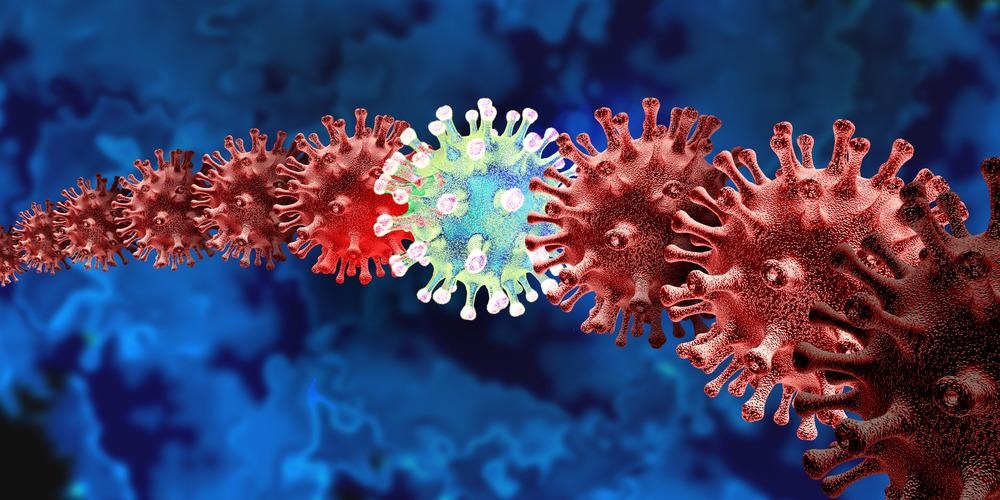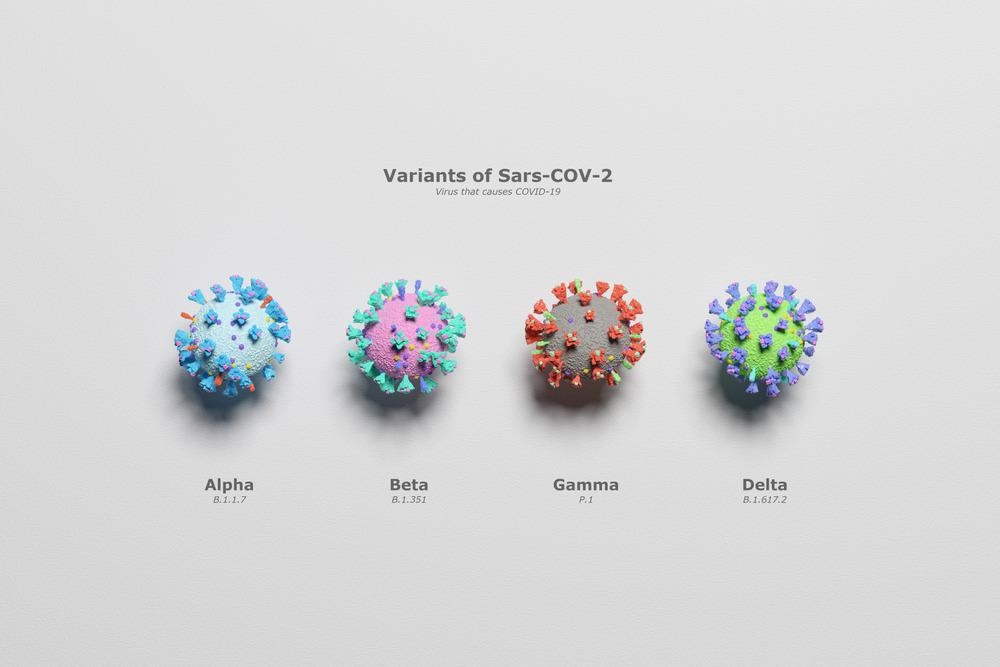Viruses can change and alter their genetic make-up. When these changes occur, the virus may become more or less of a threat to the human host. Virologists are therefore interested in tracking the evolution of the viral genome.

COVID-19 variant. Image Credit: Lightspring/Shutterstock.com
In the case of the SARS-CoV-2 virus, it is designated a single species, but there are differing kinds of ‘coronavirus’ that can infect the patient with essentially the same disease. These different kinds of virus have been called mutants, variants, strains and sometimes subspecies, which inevitably leads to conceptual confusion. This article looks at what we mean when we refer to a viral variant.
The term variant and the COVID-19 pandemic
Biologists deploy specific terminologies to describe viruses and the use of these terms has seeped into everyday use. Different types of viruses have been generally referred to as mutants, variants, subspecies, and strains, although there are important differences between them. The use of the term ‘variant’ is only relatively recent.
The term has been used in popular discourse in the wake of the COVID-19 pandemic. One reason for this may be the plethora of sub-disciplines and specialisms within biology, whereby scientists working in different areas of expertise tend to use different terms.
As an example, evolutionary biologists and biologically trained virologists are liable to use the term lineage to describe a distinct branch in the evolution of a virus. This stems from deference to the evolutionary tree specially created for taxonomical purposes. Meanwhile, rather than visualize the branch of a tree, experts in public health would more likely use the term ‘variant of concern’ (VOC) for a disease-causing biological organism or entity.
Perhaps then, because a global pandemic is really a public health issue this could explain why the widespread use of ‘variant’ emerged during the time of the COVID-19 pandemic. The term can be particularly useful in general discourse because it can refer to both the virus and the disease, whereas the term strain is used specifically to refer to the virus. In fact, it is rarely necessary to use the word strain as a descriptor for the SAR-CoV-2 virus as technically it is just one kind. This means the use of the term ‘variant’ can help curtail technical inaccuracies and ameliorate any problems of conceptual confusion.
A good example of a variant is that of Delta. The Delta variant (B.1.617.2) was only very recently (Fall 2021) the most common type of coronavirus in the US. The ability to infect human cells was doubled in this virus comparative to other variants of the virus ––a superpower that has since been superseded by Omicron. Delta was thought likely to cause more severe illness in those who contracted it ––though this fact is debated amongst experts.

COVID-19 variants. Image Credit: Mediantone/Shutterstock.com
The categorization of coronavirus variants
Organizations such as the World Health Organization (WHO) and the Centers for Disease Control and Prevention (CDC) have organized coronavirus variants into categories. The classifications are as follows:
Variant of interest
This is a coronavirus variant that virologists are keeping a keen eye on so to speak. It is a predictive category whereby the virus has acquired certain characteristics that need to be keenly watched. This variant has genetic alterations that give it the potential to be more transmissible, to cause more severe illness or to better evade the immune system or genetic testing.
Variant of concern
Here the virus is known to be more infective to the host. This infectivity is no longer a potential but has been directly observed to occur. This type of coronavirus can also be more likely to affect vaccinated individuals or re-infect those who have been previously infected. These kinds of variants have a heightened potential to cause severe illness, evade diagnostic tests or resist anti-viral treatment.
Variant of high consequence
This is a coronavirus variant for which the currently available vaccines do not offer protection. Such variants have not arisen in the case of SARS-CoV-2 (as of the present time January 2022).
The ‘new’ Omicron variant ––is it less severe?
As of 26 November 2021, the World Health Organisation (WHO) named variant ‘B.1.1.529’ specifically as a VOC. This came after news that the Technical Advisory Group on Virus Evolution (TAG-VE), a WHO affiliated unit, had determined that Omicron possessed several mutations that could alter its functionality, transmissibility and concomitantly the severity of illness likely to be caused. As of 13 January 2022, the Omicron variant had been identified in all EU/EEA countries. At present (January 2022), evidence suggests that those infected with Omicron VOC will likely present clinically with lesser severity than those infected with Delta. This evidence is only preliminary, and it is much too early yet to make an assessment. What is clear is that vaccination remains pivotal to any multi-layered approach to combating both Omicron and Delta VOC.
References:
- Bollinger, R. et al. (2021) Covid variants: what you should know. Online: https://www.hopkinsmedicine.org/health/conditions-and-diseases/coronavirus/a-new-strain-of-coronavirus-what-you-should-know.
- Chamary, J. V. (2021) What’s the difference between a variant, mutant and strain? Forbes. Online: https://www.forbes.com/sites/jvchamary/2021/02/28/coronavirus-covid-variant-mutant-strain/?sh=fb51aa52241d.
- Desimone, D. C., (2021) Covid-19 variants: what’s the concern? Online: https://www.mayoclinic.org/diseases-conditions/coronavirus/expert-answers/covid-variant/faq-20505779.
- European Centre for Disease Prevention and Control (2022) Weekly epidemiological update: Omicron variant of concern (VOC) – week 2 (data as of 13 January 2022) EU/EEA. Online: https://www.ecdc.europa.eu/en/news-events/weekly-epidemiological-update-omicron-variant-concern-voc-week-2-data-13-january-2022.
- Roberts, M. (2021) What is the Delta variant? Online:
- https://www.bbc.co.uk/news/health-55659820.
- UKRI (2020) Are there different strains of the SARS-Cov-2 virus circulating? Online: https://coronavirusexplained.ukri.org/en/article/cad0013/.
- WHO (2020) Update on Omicron. Online: https://www.who.int/news/item/28-11-2021-update-on-omicron.
Further Reading
- All Coronavirus Disease COVID-19 Content
- The COVID-19 Pandemic: What have the experts learned?
- What Mutations of SARS-CoV-2 are Causing Concern?
- COVID-19: A Timeline From 1st Case to Vaccination
- What is COVAX?
Last Updated: Feb 14, 2022

Written by
Dr. Nicola Williams
I’m currently working as a post-doctoral fellow in the History of Science at the Leeds and Humanities Research Institute (LAHRI), at the University of Leeds. Broadly speaking my research area falls within the remit of the history of biology and history of technology in the twentieth century. More specifically I have specialist knowledge in the areas of electron microscopy and cellular and molecular biology, women in science and visual culture.
Source: Read Full Article